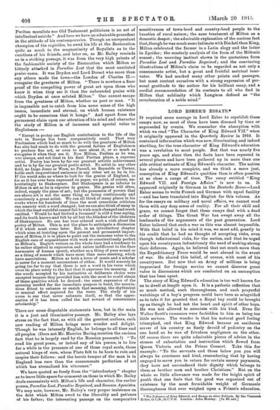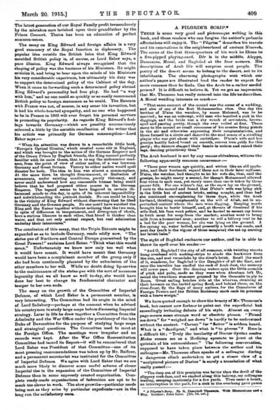LORD ESHER'S ESSAYS.*
Ir required some courage in Lord Esher to republish these essays now, as most of them have been dimmed by time or superseded by events. We remember the absorption with which we read "The Character of King Edward VIL" when it originally appeared in the Quarterly Review in 1910. It contained information which was new, illuminating, and indeed startling, for the true character of King Edward's education was a revelation to moat people. But that was nearly five years ago, and since then the feels have been repeated in several places and have been gathered up in more than one able critical estimate of King Edward's character. The nation has already a more complete, and we think a more just, conception of King Edward's qualities than is often possible at so close a range of time. The essay entitled "King Edward VII. and Foreign Affairs" is new to ns. It appeared originally in German in the Deutsche Revue—Lord Esher seems to write French and GerMan with equal facility —and has been translated into English for this volume. As for the essays on military and naval affairs, we cannot read them with any deep sense of reality. For all their skill and grace, we cannot forget that these essays deal with a dead order of things. The Great War has awept away all the landmarks of the arguments of the past generation. Lord Esher believed that such a war as this was almost impossible. With that belief in his mind it was, we must add, greatly to his credit that be had no thought of accepting risks, even though infinitesimal risks, for the nation, and that he urged upon his countrymen industriously the need of making strong their defences. Again, he believed that not much more than the Expeditionary Force would be sent abroad in the event of war. He shared this belief, of course, with most of his countrymen. But now that an Army of millions is being improvised for foreign service we cannot discover great value in discussions which are conducted on an assumption that has been upset.
The story of King Edward's education is too well known for us to dwell at length upon it. It is a pathetic reflection that so much method, such thoroughness, and such prayerful watchings of a boy's progress could have been so misguided as to take it for granted that a Royal boy could be brought up as though be had not the heart and spirit of other boys. He was not allowed to associate with his kind. Even Sir Walter Scott's romances were forbidden to him as being too little serious. The wonder is that his natural good feeling triumphed, and that King Edward became an assiduous server of his country as finely devoid of pedantry on the one band as lie was of frivolous negligence on the other. Of course there are quite admirable pieces of advice in the stream of exhortation and instruction which flowed from Queen Victoria and the Prince Consort. Take this for example: "To the servants and those below you you will always be courteous and kind, remembering that by having engaged to serve you in return for certain money payments, they have not surrendered their dignity which belongs to them as brother met and brother Christians." But on the whole so little allowance was made for the bright spirit of youth that one feels that the good was organized out of existence by the most formidable weight of Germanic thoroughness that ever weighed upon a Prince's education.
of the Vieeththe Eler,j.0...U. tadoa7..,.ili.t.
The latest generation of oar Royal Family profit tremendously by the mistaken care lavished upon their grandfather by the Prince Conger& Theirs has been an education of perfect
COIL111}011-8011Se.
The essay on King Edward and foreign affairs is a very good summary of the Royal function in diplomacy. The popular idea outside the British Isles that King Edward moulded British policy is, of course, as Lord Either imp, a pure illusion. King Edward always recognized that the shaping of policy was the business of his Ministers. He might criticize it, and bring to bear upon the minds of his Ministers his very considerable experience, but ultimately his duty was to support the determined policy of the Cabinet of the day. When it came to forwarding aueli a determined policy abroad King Edward's personality had free play. He had "a way with him," and no one could so quickly or so easily recommend British policy to foreign statesmen as he could. The Entente with France was not, of coulee, in any sense his invention, but it had his whole-hearted sympathy, and no one who happened to he in France in 1903 will ever forget his personal services in promoting its popularity. As regard. King Edward's feel- ings towards Germany—which are possibly unconsciously coloured a little by the amiable recollection of the writer that his article was primarily for German eonaumption—Lord Esher says r-
" When his attention was drawn to a remarkable little book,
• Europe•. Optical Illusion,' which created some stir in England, and which was brought to the aeries of the German Emperor and of the Crown Prime by English friends, the King seemed perfectly familiar with its main thesis, that is to say the midsummer mad- ness, from the point of view. of either nation, of a war between Germany and Great Britain. Victory to either nation would spell disaster for both. The idea to hue was almost a coremouplatm. At the same tame, he thought disarmament, or limitation of armaments, under existing conditions, purely visionary, and sever mold understand hew any reasonable human being could believe that be had proposed either course to the German, Emperor. The legend seems to have lingered in certain ill- broanced minds to this day, in spite of Its inherent impossibility and notwithstanding the plainest denials. No one could he long in the vioinity of King Edward without discovering that he liked Germany and the German peopte. No one could have watched the King and the Kaiser together without noticing that the two men, in spite of difference in temperament, and divergence of ideals, bore a curious likeness to each other, that blood is thicker than water, and that not only mutual respect, but real admiration underlay their intercourse."
The conclusion of this essay, that the Triple Entente might be expanded so as to include Germany, reads oddly now. "The status quo of Northern and Central Europe guaranteed by the Great Powers!" exclaim,' Lord Esher. "Think what this would mean." Unfortunately we know now only too well what it would have meant. It would have meant that Germany would have been a complaisant member of the group only if she bad been continually placated by the submission of the other members to her will While no doubt doing lip-service to the maintenance of the statue quo with the sort of nauseous ingenuity that we all know no well to-day, she would have done her beat to change its fundamental character and temper to her own ends.
The essay on the growth of the Committee of Imperial Defence, of which Lord Esher is a permanent member, is very interesting. The Committee had its origin in the mind of Lord Salisbury—perhaps at the moment when he sdrieed his countrymen to study large maps before dismissing Imperial strategy. later in life he drew together a Committee from the Admiralty and the War Office under the presidency of the late Duke of Devonshire for the purpoee of studying large maps and strategical questions The Committee used to meet at the Foreign Office. The meetings were irregular and no records were kept. After the War Office Reconstitution Committee had Nailed its Report—it will be remembered that Lord Esher was President of that Committee—one of its most pressing recommendations was taken up by Mr. Balfour, and a permanent secretariat was instituted for the Committee of Imperial Defence. We agree with Lord Esher that we are much more likely to discover some useful scheme of closer Imperial ties in the expansion of the Committee of Imperial Defence than in some expressly created organization. Com- plete ready-made organizations of federation are apt to be much too clever to work. The slow growths—particular needs being met as they arise by particular expedients--are in the long run the satisfactory ones.







































 Previous page
Previous page